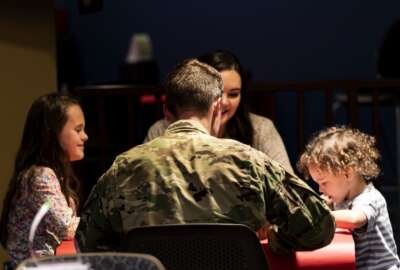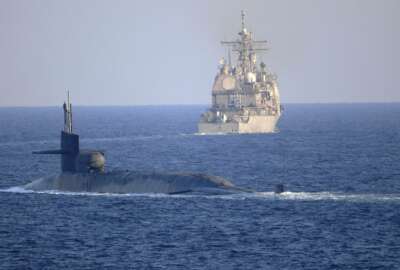DoD taking steps to scope military hunger issue
Some military families may not be eligible for SNAP because of the housing allowance they receive.
The Pentagon is taking new steps to chronicle, understand and address hunger within service member households.
After new academic reports surfaced showing nutritional deficiencies within the force and issues with food security in military families, the Defense Department said it is now gathering data and analyzing relevant statistics to scope the problem.
Patricia Montes Barron, deputy assistant Defense secretary for military community and family policy, said the department will soon start to pilot a food insecurity assessment tool for military family counselors to use when meeting with service members and their families.
“The reason we’re doing that is because it’s one of those things it’s hard to bring up, ‘Oh gee. Did you eat well today?’ How do you bring that up?” Montes Barron said Tuesday during a Center for Strategic and International Studies event. “This assessment tool is really going to help us to start a conversation to determine if the individuals we’re coming across need our support and if they need our support immediately.”
Military hunger is an issue that is only recently coming to light, and is still not well studied.
MAZON, an organization focused on fighting hunger, released a report in the spring detailing how military families are slipping through the cracks of the United States’ safety net.
The problem at hand is that many low-income service members lose out on SNAP benefits because of the basic allowance for housing all troops receive. That allowance helps service members pay for rent or a mortgage.
“The Agriculture Department counts this housing allowance toward your income, despite the fact that the IRS does not treat it as income and other federal subsidy programs do not treat it as income,” Abby Leibman, president and CEO of MAZON, told Federal News Network in April. “We see this as a glitch. What it does is misrepresent service members’ income so they cannot qualify for SNAP despite the fact that that money is actually ongoing for housing costs and cannot be spent on food.”
More recently, the Agriculture Department ran a study on military food security, marking only the second academic look at military food issues.
“There’s really two key findings that are really important to focus on here. The first is that one in three active duty soldiers in our sample were classified as marginally food insecure,” said Matthew Rabbit, an economist at the USDA Economic Research Service. “The second key finding here is that the mental health of our service members is key to their long term connection to the military and the wellbeing of their families. Given that we find the service members’ mental health is associated with their food insecurity; addressing food insecurity may be one way to improve these outcomes.”
Marginally food insecure encompasses individuals who report any indications of compromised economic access to food among themselves and their families, which are classified as having marginal, low or very low food security according to the Agriculture Department’s food security status classification system.
COVID only compounded those issues. Financial instability, coupled with children staying at home and missing out on subsidized meals, put pressure on military families.
Shelley Kimball, senior director of research and program evaluation at the Military Family Advisory Network, said her organization’s surveys found that military families were having trouble accessing nutritious foods.
Congress is considering stepping in to address the problem. The Senate Armed Services Committee of the 2022 defense authorization bill and the House Armed Services Military Personnel Subcommittee markup contain a provision and recommendation for a basic needs allowance for low-income service members living in high-cost areas.
That language is based off of legislation introduced by Reps. Jimmy Panetta (D-Calif.) and Don Young (R-Alaska) in April.
“Currently, there are federal regulations that unintentionally cause military families to lose out on SNAP benefits,” Panetta said in a statement. “Our bipartisan Military Hunger Prevention Act would make up for that loss by providing certain military households with a basic needs allowance to purchase groceries. Although it’s unfortunate that some military families have to resort to SNAP, it’s our responsibility to ensure that those families, at the least, have access to the necessary support they need to lead healthy, food secure lives.”
Copyright © 2025 Federal News Network. All rights reserved. This website is not intended for users located within the European Economic Area.
Scott Maucione is a defense reporter for Federal News Network and reports on human capital, workforce and the Defense Department at-large.
Follow @smaucioneWFED







